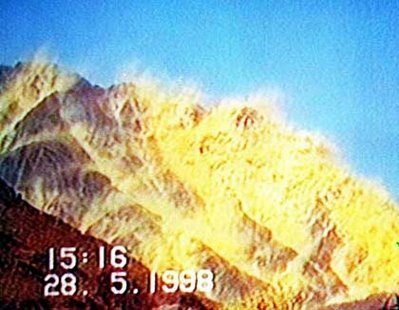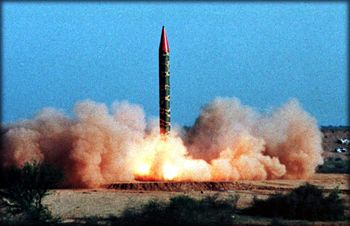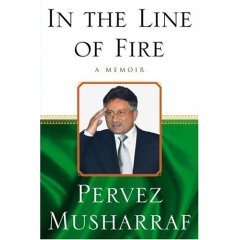 By S. Farooq Hasnat
By S. Farooq HasnatIssue 03 Volume 05, July 07 - 13, 2005
In the past, the policymakers mishandled the Kashmir issue, today the Kashmiris are forced to change their course of action for freedom

For more than one-and-a-half years, General Musharraf has been bending backwards to accommodate the Indian leaders. His declared intention is to resolve the Kashmir dispute, during his tenure in office. On one occasion he said that the dispute could be resolved in two weeks. To engage the Indian leadership, he took a number of steps including his New Delhi and Agra visits and withdrawal of ban on Kashmiris travel across the Line of Control. Along with that, meetings between the officials of the two countries were initiated to look into Siachen Glacier, Wullar Barrage, Baglihar dam and other disputes.
The critics of Musharraf's policy of reconciliation with India argue that although he offered many concessions, one after another, he got little in return. They further said that in real terms, a tacit understanding with India has been undertaken that the Line of Control (LoC) will be converted into an international border between the two countries. The General refutes these allegations and says that his proposals do not negate the principled stance of Pakistan. As a result of these developments, the tensions between the two countries eased out, but so far no substantial progress has been made, either on 'minor' issues or on Kashmir itself. However, the single most significant headway was the two-week long visit of the nine Kashmiri leaders, of which five were from the 'moderate' wing of All Party Hurriyat Conference (APHC), to Azad Kashmir and Pakistan. The snag of the visit was the absence of Syed Ali Geelani, leader of his own faction of the Hurriyat. He declined the Pakistani invitation by saying that he had decided to show his 'resentment' of what he called Pakistan government's 'deviation from its stand on Kashmir'. He further said that India has not shifted from its standpoint on Kashmir and he was not sure what he will bring back from the Pakistan visit. It was felt in Pakistan that Geelani's decision had dampened the initiative to start a dialogue with the Kashmiri leaders in held Kashmir. After all, Syed Ali Geelani was the one who once called himself 'a proud Pakistani'. Another key Kashmiri, Shabbir Shah wrote, 'Kashmiri' in the Indian passport application's citizenship column, and was refused the passport.
The Hurriyat leaders' visit to Pakistan changed the whole scenario of the Kashmir dispute, when they clearly made home their point that any future solution to the Kashmir issue must be initiated by the Kashmiris, themselves. They further said that they would not accept, as has been a practice in the past, that Kashmir is labelled as a territorial dispute between Pakistan and India.Hurriyat's key spokesman and held Kashmir's spiritual leader, Mirwaiz Umar Farooq even denied the relevance of the 1948 resolutions, of the United Nations Security Council. These utterances made irrelevant the long drawn position of Pakistan, for which it worked hard for five decades. Mirwaiz, on his return to Srinagar, wrote an article in the Hindustan Times, saying that it will not be acceptable to split Kashmir on the basis of 'religion, ethnic or regional divisions'. He further wrote that his group intends to continue a dialogue with Pakistan as well as the Indian leadership, on separate tracks. According to him, "This will give Kashmiris a sense of genuine involvement, a must for any progress towards resolution". Mirwaiz made it clear that attempts to converge the LoC into a permanent international boundary would be a reprehensible action. These remarks by the Kashmiri leaders sent ripples across the relevant circles in Azad Kashmir and Pakistan. There is no doubt that one main fallout of the Hurriyat visit is that the initiative has been taken away from Pakistan and the Kashmiris themselves have taken the driving seat. While addressing thousands of Kashmiris, at a mosque in Srinagar, after his return from landmark 14 days visit to Azad Kashmir and Pakistan, Mirwaiz declared that General Musharraf told him "Any solution acceptable to the people of Kashmir will be acceptable to Pakistan". This is not what the Pakistani military leadership had expected. After all it marginalised Pakistan's position and the circumstances are moving fast towards the conception of an independent Kashmir. Another aspect to be considered is that whether the gestures by the Indian government are to defuse as well confuse the issue or are serious attempts to resolve the dispute according to the desires of the Kashmiri people. Representing this viewpoint, a noted Lahore daily wrote in its editorial of June 22, that "The whole idea behind the façade of Indian sincerity in resolving disputes one hears so much about, is to achieve normalisation with Pakistan, extract the maximum concessions from it in the economic and commercial spheres and stabilise peaceful conditions in the Subcontinent. It seems under the impression that it has found the present government in Islamabad a willing partner."Many in Pakistan feel that the establishment fall prey to its own manoeuvring, where before the visit, little or no homework was done. It is also believed that confused, unclear and foreign formulas were destined to meet this fate. To a certain extent, the grievances of the Kashmiri leaders are justified.
The Kashmir dispute was dealt by both the warring neighbours as purely a territorial dispute. Whenever, and at whatever level the matter was discussed, the role of the Kashmiri people was ignored. It had become purely an issue within the larger range of Pakistan-India bilateral relations. More than 80,000 Kashmiris have lost their lives and countless women have been raped since the 1989 home grown revolt against the 700,000-strong Indian forces, but these gross human rights violations remained part of the bilateral dispute.When the Soviet Union left Afghanistan, jihadis stepped up their activities in Kashmir. But it blemished the legitimate Kashmiri struggle. At the same time, as a result of jihadi fallout, the Pakistani society suffered tremendously, in the shape of rising militancy and violence. Steve Coll, a critic of Pakistan policies in Afghanistan and Kashmir writes: "Infrastructure needed to produce jihadists proved corrosive for Pakistani society, a development not appreciated at that time by those who developed the strategy. As it turned out, a heavy price was paid for the reliance on groups whose members were deeply committed to fundamentalism. Often these groups began to penetrate Pakistani society." The settlement of the Kashmir dispute will always be difficult, as stakes are very high for India, for Pakistan and for the freedom-fighters. It has to be accepted that the lingering Kashmir dispute is highly complex as well as emotionally charged, for all the concerned parties. Moreover, the post-9/11 world, where the Americans are enforcing their agenda, makes even a genuine Kashmiri armed struggle for freedom more difficult. It is in this context that an assessment as well as solution to the Kashmir dispute is to be made. There are certain compulsions that must be mentioned under which Pakistan has to operate. Pakistan supporting the freedom-fighters' armed struggle, either tacitly or otherwise, would not be acceptable under the norms of the new international value system.
The era of jihadi groups is over. Nowhere in the future would the world community accept these groups as a valid means of struggle for the right of self-determination. In the past, the Pakistani policymakers mishandled the Kashmir issue and today the Kashmiris are forced to change their course of action for freedom, where even the meaning of freedom has to be rewritten.







